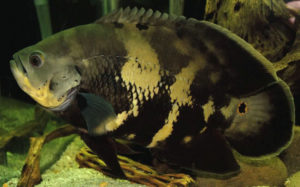31 Mar OSCAR – Astronotus Ocellatus – facts info

Name and family:
Astronotus ocellatus, Marble Cichlid, Velvet Cichlid, Acara Ocellatus, Acara Crassipinnis, Cychla rubroocellata, Hygrogonus Ocellatus, Lobotes Ocellatus.
The Oscar is a freshwater fish belonging to the cichlid family, especially prevalent in Brazil, Peru, Colombia.
Feature and behavior:

Fishes’s coexisistence:
The Oscar is a herd fish and it should live with 4/5 specimens, so in aquariums not less than 600 liters, but it can also be alone. It’s important not to put it in the company of small fish, which would be eaten fast. It has a very aggressive character, often if it takes it with its own reflection, opening the gills and changing color, can even jump out in some cases. The only compatible fish are large clean fish such as Ancistrus or Arowana or Black Bass in large aquariums.
Sexual dimorphism and breeding:
There is no sexual dimorphism between males and females, it is possible to recognize the sexes only during mating since the male genital papilla presents a conical shape, while in the female is truncated.
Feeding and mantenance:
Oscar is omnivorous but mostly carnivorous. They are voracious predators with much appetite and feed on aquatic invertebrates (shrimp and mosquito larvae), small fish like guppies, amphibians, pieces of meat from carcasses of dead animals in the water. Often to feed it eradicates younger aquatic plants. Even if you love beef, heart and liver, we are advised not to administer to the poor digestibility and assimilation. It is therefore recommended in the form of dry granules or sticks.
Price:
Dai 15 ai 100 euro.



 English
English Italiano
Italiano